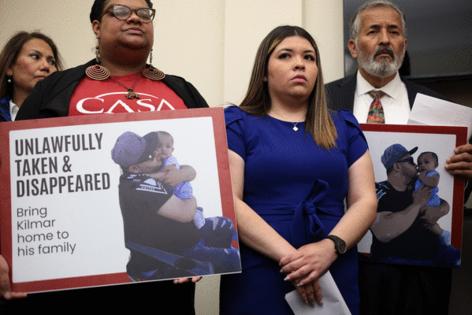Judge says US officials likely in contempt over deportations
Published in News & Features
WASHINGTON — A federal judge said there is “probable cause” to hold Trump administration officials in criminal contempt of court for sending accused Venezuelan gang members to an El Salvador prison last month despite his order to immediately halt the deportations.
U.S. District Judge James Boasberg issued an order Wednesday saying that officials acted in “willful disregard” of his verbal order on March 15 to turn around planes carrying Venezuelans now held in a notorious prison in El Salvador. Boasberg had said at a court hearing on April 3 that “the government acted in bad faith” throughout that day.
“The court ultimately determines that the government’s actions on that day demonstrate a willful disregard for its order, sufficient for the court to conclude that probable cause exists to find the government in criminal contempt,” Boasberg wrote in Washington federal court. “The court does not reach such conclusion lightly or hastily; indeed it has given defendants ample opportunity to rectify of explain their actions. None of their responses has been satisfactory.”
The case is one of the highest-profile fights between President Donald Trump’s administration and a judge weighing one of more than 250 lawsuits that seek to slow the White House agenda. After Trump called for Boasberg’s impeachment, Chief Justice John Roberts issued a rebuke.
“We plan to seek immediate appellate relief,” Trump spokesman Steven Cheung said in a post on social media platform X. “The President is 100% committed to ensuring that terrorists and criminal illegal migrants are no longer a threat to Americans and their communities across the country.”
Boasberg stopped short of holding any specific officials responsible for now. He said he would give the administration a chance to comply with his earlier order — potentially by asserting that the U.S. retains control over the people in the Salvadoran prison and ensuring that they can make their case to a federal judge in the U.S.
If the administration doesn’t come into compliance, Boasberg said he would identify the individuals to refer to the Justice Department for possible criminal prosecution. He said he’ll appoint an attorney to pursue the case if the Justice Department declines to do so.
The administration has staunchly resisted the notion that it remains in control of the detainees. In a separate case involving a man who was deported to the same prison in error, the administration said Tuesday that the man was “being held in the sovereign, domestic custody of the independent nation of El Salvador.”
Boasberg said he wasn’t requiring that the detainees be immediately released or returned to the U.S.
The judge issued the order despite a Supreme Court ruling on April 7 that tossed out Boasberg’s order pausing the deportations. Boasberg said that ruling “does not excuse the government’s violation.” The U.S. Constitution “does not tolerate willful disobedience of judicial orders.” To do so would make a “solemn mockery” of the “constitution itself,” he wrote, citing an 1809 Supreme Court opinion.
On March 15, Trump invoked the Alien Enemies Act of 1798, a wartime statute, to deport alleged members of Tren de Aragua gang under The law was previously used only in the War of 1812, World War I and World War II. Boasberg put the removals on hold that day over concerns about due process, triggering a battle over the president’s authority to invoke the law.
Just after midnight on March 15, five Venezuelans sued in anticipation of Trump using the Alien Enemies Act. That morning, Boasberg temporarily barred deportation of those five. At 3:53 pm, Trump made public a proclamation invoking the law. By then, the U.S. prepared to fly more than 200 people on three planes from southern Texas.
Boasberg had a second hearing that day, ordering a Justice Department lawyer, Drew Ensign, to tell immigration officials to immediately turn around any flights. But two flights proceeded anyway, despite the judge taking a break so that the lawyer could convey his order to Justice Department and immigration officials. A third flight left after his oral order.
At a hearing on April 4, Boasberg pressed Ensign for the names of everybody he communicated with about his order that day. Ensign named seven officials at the Justice, State and Homeland Security departments who may have learned of the judge’s order. In his order on Wednesday, Boasberg said that if U.S. officials “do not choose to purge their contempt,” he will identify which people caused the contempt through a “specific act or omission.”
Justice Department lawyers have previously said they didn’t have to comply with Boasberg’s oral order on March 15 because he soon issued a written order that didn’t direct the planes to turn around.
_____
(With assistance from Zoe Tillman and Erik Larson.)
_____
©2025 Bloomberg L.P. Visit bloomberg.com. Distributed by Tribune Content Agency, LLC.







Comments